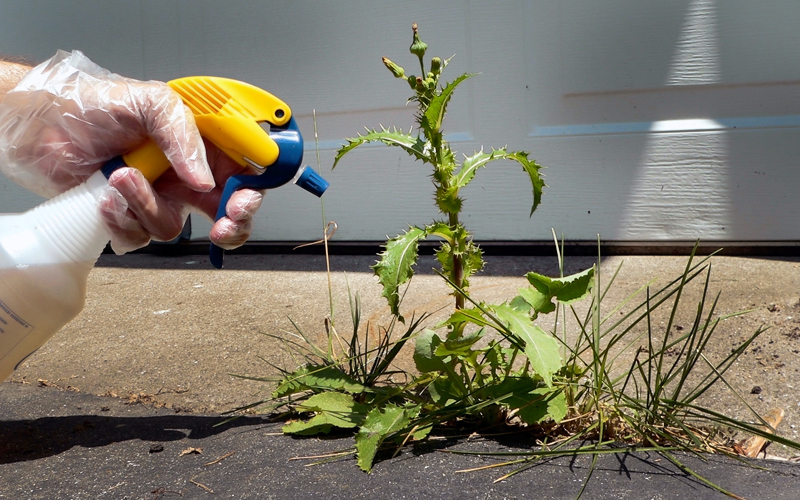
by guest blogger Leah Zerbe, online editor for RodaleNews.com
For years, chemical reps assured farmers that Roundup was safe and “biodegradable.” Fast-forward and farmers now spray more than 185 million pounds of glyphosate—the active ingredient in Roundup—on U.S. food crops.
It’s also the most popular weedkiller used in yards, gardens, parks, and playgrounds all across America. The problem with all of this? The World Health Organization’s International Agency for Research on Cancer just reviewed the latest non-industry-funded science and concluded that glyphosate must be labeled a “probable human carcinogen.” Specifically, exposure to the chemical is linked to non-Hodgkin’s lymphoma. In animal studies, it’s tied to other forms of cancer, too.
Farmers use so much glyphosate that it’s been detected in the air, rain, our food, and yes, even us. As weeds continue to outsmart the chemical, farmers spray more and the government raises the allowable limits in our food. Concerning!
And the new trouble with Roundup doesn’t end there. In a separate study just released, New Zealand researchers found that Roundup actually has the ability to change pathogenic bacteria in a way that makes important antibiotics less likely to work when they cause infections.
The authors exposed both E. coli and Salmonella to combinations of one of five antibiotics and glyphosate.
I interviewed lead study author Jack Heinemann, PhD, professor and lecturer of genetics at the University of Canterbury in New Zealand, for a story that ran on Rodale News. Here’s how he broke down the science: The way Roundup causes this effect is likely by causing the bacteria to turn on a set of genes that are normally off. “These genes are for ‘pumps’ or ‘porins,’ proteins that pump out toxic compounds or reduce the rate at which they get inside of the bacteria. Once these genes are turned on by the herbicide, then the bacteria can also resist antibiotics. If bacteria were to encounter only the antibiotic, they would instead have been killed. In a sense, the herbicide is ‘immunizing’ the bacteria to the antibiotic.”
Carmen Cordova, a microbiologist at Natural Resources Defense Council, also shares her breakdown of the breakthrough study:
- Exposing the bacteria to glyphosate and antibiotics generally made them temporarily resistant to the antibiotic.
- The authors suggest that bacteria may be reacting to the presence of the herbicide and going into overdrive to pump out or “kick out” the herbicide and anything else, including the antibiotic, out of their bodies.
- This temporary resistance could be a problem for people or animals who are exposed to higher levels of these herbicides while being treated with an antibiotic at the same time. This is especially a concern for agricultural workers and also for honeybees who are getting the double hit as they forage for nectar.
The bottom line? DDT was once thought safe, too. Are we going to keep believing chemical companies when they promise a pesticide is safe, only to find out years later it has threatened human lives? It’s time for some meaningful chemical reform in the United States, reform that protects people, not the pocketbooks of chemical corporation executives. (Here are 8 great questions you should demand your representative ask when it comes to chemical reform.)
 Leah Zerbe is online editor for Rodalenews.com. Prior to working at Rodale, she was the senior online editor at NBCPhiladelphia.com, where she headed up the station’s online “Going Green” initiative, wrote about center-city crime and traffic jams, and blogged about her beloved Philadelphia Phillies. She and her husband run a sustainable organic farm in Schuylkill County, where they grow vegetables, strawberries, herbs, and flowers and raise heritage-breed chickens.
Leah Zerbe is online editor for Rodalenews.com. Prior to working at Rodale, she was the senior online editor at NBCPhiladelphia.com, where she headed up the station’s online “Going Green” initiative, wrote about center-city crime and traffic jams, and blogged about her beloved Philadelphia Phillies. She and her husband run a sustainable organic farm in Schuylkill County, where they grow vegetables, strawberries, herbs, and flowers and raise heritage-breed chickens.




Heartbreaking. We’ll never learn. The more it’s said, the less we listen, because we need the perfect yard and flower beds. I can’t begin to imagine what the farmers go through. I have started using, in the last couple of years, vinegar, Epsom salt and dish liquid combined to kill weeds in my pavers. It works! I have to spray it a bit more often, but at least it does the job without doing me, my pet, the grass, or visitors harm. There are other home remedies that we can use, it just takes a little more time and effort. It’s worth it. Better that, than the alternatives. Thanks Leah for reminding us yet again!
And yet, no matter how loud we speak, how often we beg for the companies and our own Congress to stop the production and use of Roundup – our voices are drowned out by the profits the companies make and the bribes they pay to get our elected officials to look the other way. How do we get this poison out of our world when money speaks louder than all our voices combined?? I boycott it but my own uncle buys it and sprays it like water all over his lawn and garden. I refuse to eat any of the produce from it and am glad I moved out of my rental house into an apartment where I don’t have to live and breath and walk over the grass every day. And the fact that the weeds he keeps spraying only get bigger and stronger still doesn’s stop him from his fanatical use of it all the time. I worry about our world more and more. Especially our young ones who are so vulnerable. Thanks Leah, keep up the good work.